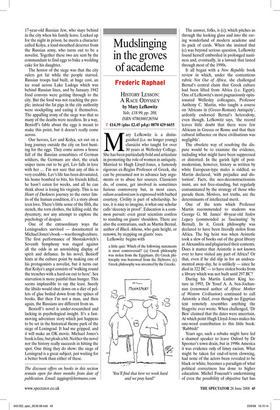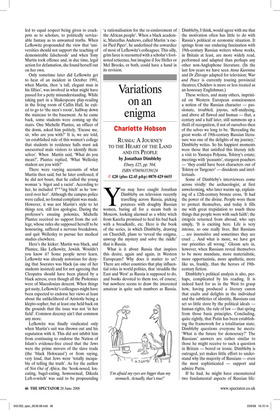Mudslinging in the groves of academe
Frederic Raphael
HISTORY LESSON: A RACE ODYSSEY by Mary Lefkowitz Yale, £18.99, pp. 208, ISBN 9780300126594 ✆ £14.39 (plus £2.45 p&p) 0870 429 6655 Mary Lefkowitz is a distinguished (i.e. no longer young) classicist who taught for over 30 years at Wellesley College. She has been particularly bold and articulate in promoting the role of women in antiquity. Married to Hugh Lloyd-Jones, a famously rigorous ex-Regius Professor of Greek, she can be presumed not to advance lazy arguments or to abuse her sources. Classicists do, of course, get involved in sometimes furious controversy but, in most cases, odium academicum is expressed with barbed courtesy. Civility is part of scholarship. So too, it is nice to imagine, is what one scholar calls ‘decency in proof’. Education is a common pursuit: even great scientists confess to standing on giants’ shoulders. There are also the contrarians, such as Martin Bernal, author of Black Athena, who gain height, or renown, by stepping on giants’ toes.
Lefkowitz begins with
a little quiz: Which of the following statements is most controversial? (a) Greek philosophy was stolen from the Egyptians. (b) Greek philosophy was borrowed from the Hebrews. (c) Greek philosophy was invented by the Greeks.
The answer, folks, is (c); which pitches us through the looking glass and into the raving wonderland of modern academe and its pack of cards. When she insisted that (c) was beyond serious question, Lefkowitz found herself embroiled in prolonged nastiness and, eventually, in a lawsuit that lasted through most of the 1990s.
It all began with a New Republic book review in which, under the contentious rubric Not Out of Africa, she challenged Bernal’s central claim that Greek culture had been lifted from Africa (i.e. Egypt). One of Lefkowitz’s most pugnaciously opinionated Wellesley colleagues, Professor Anthony C. Martin, who taught a course on ‘Africans in (Greco-Roman) Antiquity’, ardently endorsed Bernal’s heterodoxy, even though, Lefkowitz says, ‘the record leaves little doubt that there were few Africans in Greece or Rome and that their cultural influence on these civilisations was negligible’.
The obsolete way of resolving the dispute would be to examine the evidence, including what might have been suppressed or distorted. In the garish light of postmodernism, however, history as written by white European-type males is riddled, so Martin declared, ‘with prejudice and distortion’. Facts, the neo-deconstructionists insist, are not free-standing, but regularly contaminated by the strategy of those who parade them. Motives, not truths, are the determinants of intellectual merit.
One of the texts which Professor Martin recommended to students was George G. M. James’ 40-year-old Stolen Legacy (commended as ‘fascinating’ by Bernal). In it, Greek philosophy was declared to have been literally stolen from Africa. The big heist was when Aristotle took a slew of books out of the great library at Alexandria and plagiarised their contents. Does it matter that Aristotle is not known ever to have visited any part of Africa? Or that, even if he did slip in for an undocumented away-day, he is unlikely — since he died in 322 BC — to have stolen books from a library which was not built until 297 BC?
During his Martin Luther King lecture in 1993, Dr Yosef A. A. ben-Jochannan (renowned author of Africa: Mother of Western Civilisation) continued to call Aristotle a thief, even though no Egyptian text remotely resembles anything the Stagyrite ever wrote. When challenged, ‘Dr Ben’ claimed that the dates were uncertain. At which point Hugh Lloyd-Jones makes his one-word contribution to this little book: ‘Rubbish!’ Years ago, such a rebuke might have led a shamed speaker to leave Oxford by Dr Spooner’s town drain, but in 1990s America it was evidence only of limey racism. What might be taken for end-of-term clowning, had none of the actors been revealed to be black or white, becomes a paradigm of what political correctness has done to higher education. Michel Foucault’s undermining of even the possibility of objective fact has led to equal respect being given to crackpots as to scholars, to politically serviceable fantasy as to unwanted truths. When Lefkowitz propounded the view that ‘universities should not support the teaching of demonstrable falsehoods’ and when Tony Martin took offence and, in due time, legal action for defamation, she found herself out on her own.
Only sometime later did Lefkowitz get to hear of an incident in October 1991, when Martin, then ‘a tall, elegant man in his fifties’, was involved in what might have passed for a petty misunderstanding. While taking part in a Shakespeare play-reading in the living room of Caflin Hall, he exited to go to ‘the men’s room’, halfway down the staircase to the basement. As he came back, some students were coming up the stairs. One Michelle Plantec, an officer of the dorm, asked him politely, ‘Excuse me, sir, who are you with?’ It is, we are told, ‘an established rule of this women’s college that students in residence halls must ask unescorted male visitors to identify themselves’. When Martin said, ‘What do you mean?’, Plantec replied, ‘What Wellesley student are you with?’ There were varying accounts of what Martin then said, but he later confessed, if he did not boast, that he called the young woman ‘a bigot and a racist’. According to her, he included ‘f***ing bitch’ as he ‘towered over her’. Although the campus police were called, no formal complaint was made. However, it was not Martin’s style to let things rest, still less apologise. During the professor’s ensuing polemics, Michelle Plantec received no support from the college, whose rules she supposed herself to be honouring, suffered a nervous breakdown, and quit Wellesley to pursue her medical studies elsewhere.
Here’s the kicker: Martin was black, and Plantec, like Lefkowitz, Jewish. Wouldn’t you know it? Some people never learn. Lefkowitz was already notorious for denying that Socrates was black (as one of her students insisted) and for not agreeing that Cleopatra should have been played by a black actress, even though all the Ptolemies were of Macedonian descent. When things got nasty, Lefkowitz’s colleagues might have been expected to endorse her views at least about the unlikelihood of Aristotle being a klepto-sopher, but at least one held back on the grounds that the issue was not ‘in her field’. Common decency ain’t that common any more.
Lefkowitz was finally vindicated only when Martin’s suit was thrown out and his reputation with it. This did not inhibit him from continuing to endorse the Nation of Islam’s evidence-free creed that the Jews were the prime movers of the slave trade (the ‘black Holocaust’) or from saying, very loud, that Jews were ‘totally incapable of telling the truth’. As for the author of Not Out of Africa, the ‘hook-nosed, loxeating, bagel-eating, homosexual, Dikeda Left-o-witch’ was said to be propounding ‘a rationalisation for the re-enslavement of the African people’. When a black academic, Marcellus Andrews, called Martin ‘a racist Pied Piper’, he underlined the cowardice of most of Lefkowitz’s colleagues. This silly, grim farce is recounted with a scholar’s footnoted reticence, but imagine if Joe Heller or Mel Brooks, or both, could have a hand in its revision.



















































































 Previous page
Previous page